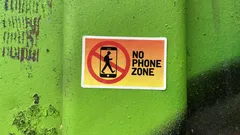221
11
4 minutes
Suggested Articles

Protect your money from phone scams with these expert-approved tips
Discover why answering certain phone calls could put your bank account at risk. Learn how phone scams work, what phrases to watch for, and smart tips to keep your money safe from cybercriminals in the US.

Unlock the hidden phone setting that protects your bank account from scammers
Online Safety & Privacy

AI-powered delivery scams are evolving—here's how to spot and stop them
Online Safety & Privacy

The magic phrase that instantly boosts your email security and stops scammers
Online Safety & Privacy

Former Hacker Reveals Secrets to Outsmart Cybercriminals and Protect Your Money
Online Safety & Privacy

How Fake Tech Support Scams Trick You and Simple Ways to Stay Safe Online
Online Safety & Privacy

Your Smartphone May Be Secretly Hacked: Spot the Warning Signs Now
Smartphones & Apps

Don’t fall for fake online promotions that can steal your identity
Online Safety & Privacy

Phone users can stop missed call scams by recognizing hidden risks
Online Safety & Privacy

Hundreds of Malicious Apps Lurk on Google Play—How to Protect Your Data
Online Safety & Privacy

Playing video games together strengthens relationships and sparks real connection
AI & Everyday Tech

US crypto pioneers transform bold risk into life-changing fortunes
AI & Everyday Tech

Tech leaders embrace waste-to-carbon solutions as Microsoft bets big on green AI
AI & Everyday Tech

Travelers and campers embrace portable backpack laundry tech for freedom and clean clothes anywhere
Gadgets & Reviews

Sleep experts champion a smart anti-snoring belt for restful nights and healthier mornings
Gadgets & Reviews

Drivers use Google Maps and Waze to avoid fines but risk safety trade-offs
AI & Everyday Tech

App lovers seize this week’s best free premium downloads before time runs out
Smartphones & Apps
 W3 CodeCraft
W3 CodeCraft

Comments